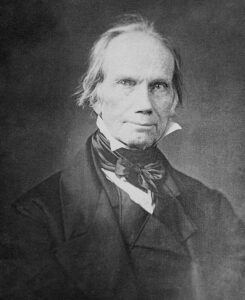In an effort to soothe the accentuating divisiveness over slavery, Whig (nationalist) Senator Henry Clay, of the Commonwealth of Kentucky, introduces his eight-point Compromise of 1850:
- Admission of the republic of California as a free State;
- Establish of territorial governments for Utah and New Mexico—without dealing with the slavery question;
- Secession of all Republic of Texas land claims simultaneously north of the 32 degrees North parallel, and west of the 103 degrees West meridian; and north of the 36 degrees, 30 minutes North parallel;
- Assumption of the Republic of Texas’ debt by the federal government;
- Abolition of the slave trade in the District of Columbia;
- Preservation of slavery in the District of Columbia;
- Passage of a more draconian Fugitive Slave Act; and
- Congressional authority to regulate interstate commerce in slaves.
[restored 2/5/2022]
Subsequent Events:
Authority:
Article I, Section 6 [Clause 1]
ccc-2point0.com/constitution-for-the-united-states
References:
Calvin D. Linton, ed. The Bicentennial Almanac: 200 Years of America, 1776-1976, (Nashville, Tennessee: Thomas Nelson, 1975), 136.


